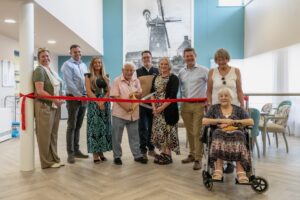 He led government efforts to tackle deprivation during a time of unprecedented public investment. The money may have dried up, but Joe Montgomery’s determination to make a difference hasn’t. Clare Goff meets him
He led government efforts to tackle deprivation during a time of unprecedented public investment. The money may have dried up, but Joe Montgomery’s determination to make a difference hasn’t. Clare Goff meets him
The Urban Land Institute was born at a time when the economic challenges were similar to those of today, says Joe Montgomery, the organisation’s recently appointed chief executive for Europe.
That year was 1936, the height of the Great Depression. Then, as now, there was a need for fresh thinking about how private developers and government work together to shape urban environments.? ‘ULI wanted to have a much bigger dialogue about how public and private combine to make our cities work well and to create prosperity and liveability,’ he says. ‘Those same themes apply now, with government having to rethink how much it can afford to spend and local authorities challenged to innovate.’
ULI has become a key adviser to government and city leaders in the US; Mr Montgomery’s job is to build similar levels of relationships across Europe by breaking down the barriers that often prevent local public and private partners from working together for the benefit of places.? ‘It shouldn’t be about a bare knuckled fight for planning permission but a shared debate about how to plan our cities.’
With public funds for regeneration disappearing, the time is ripe for greater collaboration and new thinking, and Montgomery is not short of ideas for how cash-strapped local areas can continue to find funding and thrive.
‘DCLG has reduced the availability of capital quite considerably and the onus is on public bodies to innovate, to use their assets, their regulatory powers, their role as occupier of last resort, the leverage they have with pension funds, clever joint ventures, bond issues and prudential borrowing. All of these approaches can be done sensibly but in a way that’s built on a realistic reading of what there’s a market for.’
Boosting the presence of the private sector in place-shaping discussions is quite a change for Mr Montgomery, who has spent the vast majority of his career on the other side of the fence, running City Challenge in Deptford and heading up regeneration programmes in Lewisham Council before running the ODPM’s Neighbourhood Renewal Unit in 2001 and later becoming director-general for regions and communities at DCLG, a post he left earlier this year.
He could be said to be following the money; having presided over public regeneration programmes at a time when public coffers were overflowing, he has joined the private sector as its role in urban development is on the rise, with local enterprise partnerships bringing public and private sector partners together in local areas.
He is too focused on today’s challenges and opportunities to get misty-eyed about the past, but acknowledges the uniqueness of the previous era of regeneration.
‘I’d have paid for the privilege of doing some of that work,’ he says. ‘I look back on it as a great opportunity for the country to make an impact on some of the longstanding urban development challenges and a privilege for me personally. While some programmes were controversial at the time, the benefit of a long-term lens have now proved their value,’ he says.
‘Braunstone in Leicester, for example, was a neighbourhood with a huge number of voids where no one would choose to live. Despite the difficult gestation of the NDC (new deal for communities programme) there, it proved in the end to be transformatory. Collectively – ministers, authorities and residents – we managed to put neighbourhoods on the map. Neighbourhood management is now orthodox and that wasn’t the case a decade ago.
‘One of the great dividends of those programmes was the flourishing of local leadership.
‘We helped a generation of local leaders to build their confidence and capability to speak out.’
As a new age of urban development rolls out – characterised by austerity and Big Society –Montgomery has moved on. He sees similarities between Big Society and neighbourhood renewal and says that lessons can be learned from the fact that the most effective programmes from those days were those that managed to ‘bend the spend’.
‘It was always the big goal of neighbourhood renewal to bend mainstream spending so that it tackled the needs of more marginalised people and neighbourhoods more effectively. The whole premise of the programme was that it was a short term corrective but its aim was to profoundly influence mainstream programmes both in terms of bringing in local residents to shape them and encouraging local decision makers to target their spending at the places that could make the biggest impact.’
The challenge for today’s place-maker is a similar one: to use what funds there are to discover new ways to ‘bend the spend’ for the long-term benefit of local areas.
Since taking up his new role in April he has been criss-crossing Europe visiting cities and expanding the ULI offer into new territory. When I meet him in his London office he’s still buzzing about a trip to HafenCity in Hamburg.
‘I recommend a trip there. They are seven years into a 25-year programme which has both political buy-in and is credible with the markets. I was fascinated by the way they had borrowed from banks to finance some of their upfront investment which radically improved land values so that they were well able to both repay their borrowings and draw down further borrowings in a virtuous circle.’’
A key part of the ULI approach is its urban advisory panels, which put property developers and urban development experts at the disposal of a city to help them think through key challenges. Most famously, the organisation sent in experts following Hurricane Katrina to help New Orleans rethink the redevelopment of its neighbourhoods.? ULI recently completed its first European advisory panel in the UK city of Chester, which concluded that the city is trying to be ‘too many things to too many people’. Its advice was to focus on and develop the assets it already has – including its port, castle, river and zoo – to regain its status in the tourism market and it called on city leaders to engage the local business community in its revival.
Sustainability is high on the agenda at ULI and Montgomery describes the retrofitting of old buildings as ‘so big it needs all the skills and talents of both public and private players to get the UK to be where it needs to be’.
‘It’s for cities to think cleverly about the right path between incentives and regulation required to meet that challenge.’
When it comes to innovative financing for development some of the ‘cuter’ cities are starting to think about joint venture deals which pay up only when the scheme has genuinely matured and turned a profit rather than insisting on huge transfer payments upfront via section 106, he says, while the promise of TIF opens up a new platform for public private discussion.
While councils are taking on the challenge of innovation he is also heartened to see housing associations getting on board, with the likes of Places for People in talks over a £100m bond. Having watched the European Investment Bank transform the debate around the Olympic Village, he believes this is one of the great unheralded forces of regeneration investment in the UK. ‘If public bodies can structure their proposals in right way there are sources of capital out there that are sympathetic to the ambitions of cities.’
In the new environment it will be the local authorities that are good places to do business with that will have the edge over those that are ‘slow and ponderous or overly suspicious of private sector partners,’ he says, citing Birmingham and Newham as good example of how the needs of business and local government can be brought together.? ‘It’s about being more than prepared to work with developers and clever enough not to lose the public sector’s shirt in the deal. It requires a more mature commerciality as well as a very keen insight into the needs of local people and local businesses.’
The public sector funding tap that flowed so freely during the first stage of Joe Montgomery’s career has now been turned off and a new set of skills is needed to ensure local areas continue to thrive. He may only have left public office a few months ago but he has already moved on from the regeneration of the past to the challenge of forging the regeneration of the future.
‘I don’t know of any local authority that wouldn’t be interested in getting more money. The question is how can we use the talent, money, land, the power of conversation and convening we have to tackle today’s problems. That’s the challenge at the moment, we can’t undo decisions.’

















Leave a Reply